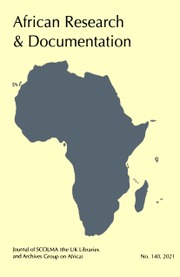Article contents
The Collection and Bibliographic Control of Grey Literature of Lesotho
Published online by Cambridge University Press: 25 April 2022
Extract
Lesotho originated as an independent African kingdom whose 19th-century monarch, King Moshoeshoe, suffered the humiliation of seeing his people's lands diminished as a result of confrontations with white settlers on the High Veld.
Not long after the creation of the Orange Free State Republic in 1854, the process of encroachment escalated, and at one point it seemed likely to lead to the extinction of Lesotho as an independent policy. King Moshoeshoe, however, astutely invited British intervention, and Lesotho survived, though it had by then lost much of its best agricultural land. The country remained under British rule for the period 1868 to 1966, a period during which it was known as Basutoland.
Information
- Type
- Articles
- Information
- Copyright
- Copyright © International African Institute 1984
References
- 2
- Cited by

